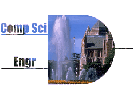
|

CSE 311 Syllabus |
|
 CSE Home CSE Home |
 About Us About Us |
 Search Search |
 Contact Info Contact Info |
|
TextbooksDiscrete Mathematics and Its Applications (sixth edition), Rosen, required, on reserveMore resources are available on the textbook website. [optional] Studentís Solutions Guide, Rosen [optional] Course OverviewThe course examines fundamentals of logic, set theory, induction, and algebraic structures with applications to computing; finite state machines; and limits of computability. The prerequisite is CSE143 and either MATH126 or MATH136.Grading
Late policyYou have one free late day throughout the quarter, which means that you can turn in one assignment one lecture late (i.e. normally on the following Monday). Otherwise (meaning for assignments that are more than one lecture late, or for any late homework after the first one), no credit will be given for late assignments.Requesting academic accommodationsIf you require academic accommodations due to a disability, please contact Disabled Student Services, 448 Schmitz, 543-8924, (TTY) 543-8925, uwdss@u.washington.edu. They will give you a letter requesting academic accommodations. Please present the letter to the instructor and we will make the accommodations you need for class.CollaborationUnless we specifically state otherwise, we encourage collaboration on homework, provided (1) You spend at least 30 minutes on each and every problem alone, before discussing it with others, (2) You write the names of people you collaborated with for each problem, and (3) You write up each solution in your own writing, using your own words, and understand the solution fully.CheatingCopying someone else's homework is cheating, as is copying solutions from another source (the web, other classes, etc.). If you are caught cheating, you can expect a failing grade and initiation of a cheating case in the University system. If you're not caught, cheating will still undermine your education, even if it might not seem like it at first. If you feel that you are having a problem with the material, or don't have time to finish an assignment, or have any number of other reasons to cheat, then talk with the instructor or the TAs. Just don't cheat. To avoid creating situations where copying can arise, never e-mail or post your solutions. You can post general questions about interpretation and tools but limit your comments to these categories. If in doubt about what might constitute cheating, ask one of us describing the situation.Topics
|
||||||||||||||||||||||||||||||||||||||||||||||||||||||||||||||
|
Computer Science & Engineering University of Washington Box 352350 Seattle, WA 98195-2350 (206) 543-1695 voice, (206) 543-2969 FAX [comments to Aram Harrow] | |